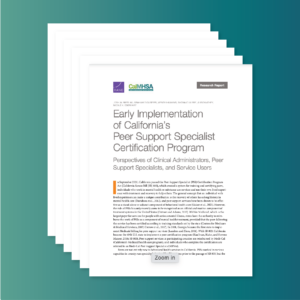Newsletter Article
RAND Study Finds Value in Peer Certification for Peers, Clients and Clinicians
 Key staff: Lucero Robles, LCSW, Director of Quality Assurance
Key staff: Lucero Robles, LCSW, Director of Quality Assurance
The RAND Corporation has published an analysis of the Certified Medi-Cal Peer Support Specialist Program. Commissioned by CalMHSA and funded by the Department of Health Care Services (DHCS), the study includes the experiences of administrators, Peer Support Specialists and service users. Key findings include:
- Positive opinions about Peer Support Specialists from all three respondent groups
- Greater understanding of the Peer role among all care providers
- Greater capacity among administrators to coordinate between Peers and clinical teams
“We asked RAND to conduct this study so that we can understand what is working in the peer certification program and what we can do to continually improve it,” said Director of Quality Assurance Lucero Robles. “These findings confirm the positive experiences we’ve been hearing from certified Peers and our county partners, and they give us a roadmap for deepening the program’s impact across the state.”
Researchers examined three key areas of the program:
- How certification and Medi-Cal reimbursement have affected the integration of certified Peers into behavioral health care
- The effect of the program on service user outcomes
- Early lessons learned about integrating certified Peers into behavioral health care
Additional findings include service users feeling they received valuable support from Peers; an improved understanding of the role of Peers, which in turn expands their confidence; and Peers reporting increased responsibility and greater autonomy.
Because the study reviewed early program implementation, some aspects were reported as too early to make a determination. For example, some Peers saw the certification as an important career milestone; some program administrators said certification would influence their decisions in hiring; and there were some reports that certification has led to wage increases. At the same time, other respondents reported that the certification program has yet to have an influence on some Peers’ careers.
Going forward, CalMHSA will work with its Stakeholder Advisory Council and DHCS to address the study’s recommendations, such as developing guidelines for involving Peers in a variety of clinical teams, continuing to remove barriers and improve quality in the certification training and exam process, and analyzing the Peer workforce’s impact on care and treatment.
April 23, 2024
